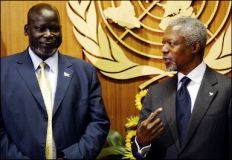Annan urges Sudanese govt and southern rebels to end civil war
By EDITH M. LEDERER, Associated Press Writer
UNITED NATIONS, Oct 4, 2004 (AP) — Secretary-General Kofi Annan on Monday urged the Sudanese government and rebels to end the 21-year civil war in southern Sudan, saying a peace accord could help end the crisis in the western Darfur region.
 In a report to the Security Council, Annan said the decision of the government and the rebel Sudan People’s Liberation Movement to resume negotiations on Oct. 7 “restores much of the optimism that has been dissipating in recent months.”
In a report to the Security Council, Annan said the decision of the government and the rebel Sudan People’s Liberation Movement to resume negotiations on Oct. 7 “restores much of the optimism that has been dissipating in recent months.”
Negotiations in Naivasa, Kenya, broke off in July after failing to reach agreement on a permanent cease-fire to the conflict in southern and eastern Sudan and future security arrangements between the national army and the rebels.
“While it is unfortunate that months have gone by without progress in these talks, I am heartened by the parties’ recent positive attitude towards concluding the negotiations as soon as possible,” Annan said. “I urge the parties to seize the opportunity … and use it to ensure that a comprehensive and lasting peace can take hold throughout Sudan.”
The conflict between the government and the southern-based SPLM rebels is separate from the 20-month rebellion in Darfur that has killed more than 50,000 people and driven 1.4 million villagers from their homes.
Sudan’s Arab-dominated government is accused of mobilizing Arab tribal fighters for attacks on Darfur’s non-Arab villagers, in retaliation for uprisings launched by two non-Arab Darfur rebel movements in February 2003. Sudan denies any responsibility and says it has disarmed some of the Arab militiamen, known as Janjaweed.
Annan was expected to release a separate report later Monday on the situation in Darfur ahead of a briefing to the U.N. Security Council on Tuesday by Jan Pronk, his top envoy to Sudan.
In his report on the southern civil war, Annan said the Oct. 7 meeting between Sudanese Vice President Ali Osman Taha and SPLM leader John Garang will provide a catalyst to proceed with peace efforts led by the Inter-Governmental Authority on Development, known as IGAD, a group of six East African states.
“The IGAD-led peace process is central to comprehensive peace in the Sudan,” the secretary-general said. “No other peace process has come so far or has addressed the fundamental roots of the conflict in southern Sudan.”
While the talks in the south don’t offer “a comprehensive solution to the country’s problems,” he said they do offer “a basis for answers to the wider issues of insecurity and conflict.”
“The current crisis in Darfur is emblematic of that problem. The rebel groups in Darfur are only two of an array of peoples and groups that have complained of systematic marginalization over the course of recent Sudanese history,” Annan said.
“There will be a need to include the peoples of all areas of the Sudan if the search for peace is to be sustainable,” he said.
“However, the peace process now requires an irreversible momentum, a defining agreement that will signal a break with the past, a change of course in Sudanese history,” Annan said.
He said such an agreement can be “a catalyst to addressing the Darfur crisis and the wide problems of economic and political marginalization that adversely affect so many in the Sudan.”
“The parties must not allow this process to stall further or derail, as it represents the best chance to achieve a peaceful solution to a long and deadly conflict that has ravaged the country and claimed so many innocent lives,” Annan said.
Last week, U.S. Ambassador John Danforth, who was the top U.S. envoy in trying to resolve the southern civil war, also said “the key to peace in Darfur” is an agreement between the government and southern rebels.
The U.S. envoy said Sudan’s Foreign Minister Mustafa Osman Ismail, who was in New York for the annual General Assembly ministerial meeting, agreed with this assessment.
Annan also said in the report that the humanitarian situation in Sudan “remains dire” and he urged international donors to provide desperately needed funds “to mitigate the appalling circumstances in which so many Sudanese find themselves.”
